This page explores the Skills, Knowledge and Hobbies of each family member.

Picture of William's model ships
William: We had woodwork, metal work for boys only, basket weaving which was done with the girls as well, woodturning and sheet metalwork. Lathes. I was taught to work, to use a wood lathe and a metal lathe; how to cut nuts and bolts, to thread them (tap them as it's called). I learnt how to do that. I started doing that when I was 11. I was top of the class for that, making horseshoes on an anvil and you had a forge, a gas forge, and you beat the metal out of an anvil. And you had to make a horseshoe, bearing in mind in those days you didn't have protective clothing or goggles or anything like that, you just did it in the clothes you went to school in, so that was that.
No one ever said anything. We also done pottery on the Potter's Wheel, that was with girls and all. So you could make pots on the treadle turntable, turning the clay. We had art classes which I liked and science classes which I liked and I got high marks for them but, unfortunately, the things that were any use I wasn't very high in. We learned about electric motors, how to make an electrode magnet, how to wind the coil of an electric motor, make a small electric motor, we were taught. Me ambition was to be a fitter and turner which I started an apprenticeship at, but my mother didn’t want me there. My father had offered through his sister to fund an apprenticeship but my mother wouldn’t have that so I had to leave and just go as a labourer which I did wherever I worked. And then I learnt other skills on a ship which was splicing rope...
Eve: So by the time you left school you had already learnt a lot of very useful skills that you were able to use in life?
William: Yes, I could put a plug top on, change light bulbs or wire a light up. You were taught how to do that. You were taught on an old electric iron. It was taken to pieces and the boys were shown how the elements worked in an old electric iron - which is still basically the same as today, how it worked. You were taught how to cut sheet metal out. You had a big saw for cutting steel bars, not all the boys were allowed to use these, but once I passed the tests I was allowed to use them on my own. In fact, I used to make things to help the teacher as he had work to do. He used to give them to me to drill and tap through. I made an aquarium. I made toasting forks which were common in those days to toast bread on a coal fire. I used to make all sorts of things. I used to make trays which were popular then out of copper ...
Eve: Can you remember learning a lot of skills and getting a lot of knowledge from school or was it…
Michael: I suppose I must have done I suppose a certain amount. Looking back on it, I don’t. I didn’t love school but then I didn’t hate it either. I was sort of middling about it. There wasn’t many times` I didn’t go to school unless I was ill. I always went. Yeah, I did all right… funny enough… I did all right in woodwork and metal work. I was pretty good at them. Academically, I suppose, I wasn’t the lowest, again I was middling sort of …results wise.
Eve: But you liked metalwork and woodwork did you?
Michael: I did that and I found I was pretty good at that and they’re the two subjects I enjoyed the best at school, woodwork and metal work.
Debbie: Which they don’t do any more.
Eve: Exactly.
Michael: Yeh, that sort of stuff I enjoyed but I don’t… I suppose yeah to a certain level I must have picked stuff up. I don’t remember learning too much in school, but then it’s probably one of them things you do without realising, and I know I’m not…perhaps if I’d applied myself a bit more, I might have done a bit better…
Eve: : Yeah to a certain degree. Again, I think the senior... you’re either… I don’t know a better word than clever…you’re either clever or you’re not. I think you can work it to a certain extent, but you’ve either got that or you haven’t in my opinion…
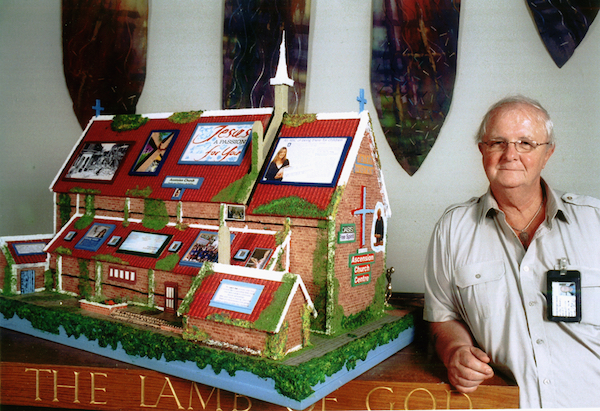
William with his model of the church
Eve: What hobbies did you have when you were young and what skills did you learn through them?
William: When I was a boy making balsa wood aeroplanes (which all boys made). I loved making balsa wood aeroplanes and ships and little wooden houses for some reason. And I liked trains. I loved train sets. Unfortunately, where I lived my mother didn't encourage any of these things as they came from my father and my mother looked down on them. My mother would be annoyed if you did them but I did do them. I used to buy at the model shop which was there years and years ago. I used to buy halfpenny strips of balsa wood and penny sheets of ply and stick them together with bolster cement. And I would cover them with tissue paper, a special kind of tissue paper and then put what's called dope on them, you can still buy dope, and that used to tighten the paper over the wings and the body of the aeroplane. We used to have an elastic band to wind up the engine and fly them or you made gliders which you threw in the air or they had a fishing-line attached. And another boy would run with the fishing line and pull the glider up into the air while you held it up in your arm.
Eve: How old were you when you did all of that do you think?
William: When I first started doing all of that I think I would have been around six years of age. Yes, I would only have been six or seven years old when I started making things. I had a Meccano set which was bought for me which learnt me a lot. I loved my Meccano set. I had an old train set which had been my brother’s and my father wanted to take back but she wouldn’t give it to him and I used to play with that when I was allowed and I loved that. That was an electrical train set, the old type, the pre-war type and we had various trucks because grandfather had made some wooden trucks and, I believe, a wooden station called Wigan.
Eve: Your grandfather used to be a carpenter didn’t he?
William: Yes, he was a joiner. He made a railway tunnel about that big because engines were bigger then and he coated it with something, I think it was plaster of Paris and then he painted it green and red and all colours in it so it was rough cast and it was a lovely thing. Probably worth a fortune now.
Eve: You've always made things haven't you?
William: Yes, I've repaired chairs and all sorts of things around there.
Eve: And how about the model you made of the church?
William: Yes, the model of the church was an exercise started at Felsted School in Essex which is a private school or public school though you can get in there with a bursary or by passing an exam. It's 400 years old, the school, and I've been there many times and they got the kids who were 11 to build a model of the Ascension church which the school had paid to have built at Custom House to teach the children to read and write. Basically it started out as a wooden shed and in 1907 they built the church and they always had a link with it, with the East End. The kids built this rough wooden church as an exercise to get 25% of their marks for their exam and I didn't see it for a long time but it was a rough church and left there. It was in a rough state but the kids had done the best they could with it. They did what they thought was right and I saw the vicar he told me about it and I remember it being unloaded off a van and I'd forgotten about it.
It was a bit large to have in the living room but I got it in and I worked on it for many months and then I took it back to the Ascension church on my bus. They couldn't believe it and they wanted to put it on public show. A school teacher came with some children from Felsted, the public school, to visit the church regularly and he said it should be in a case. So I said ‘I don't have a case. It needs polymer’. There was somewhere in Canning Town where I could buy polymer. He said ‘I'll leave £100 now, then can you start work on it right away? Can you buy the polymer and the board and make the case and a table for it? So the £100 more than covered it. So I put it on the table and made the glass or the polymer case for it and it's now used to teach the school children. It covers all the aspects of the Ascension church and the area. I went into it and put all the things that happened there. So I made small pictures or little plaques to put over it so everybody knows what happens there. So all the different classes in the church are on there if you look at it and it tells you where it originally came from.

Picture of William's book collection
Eve: But you read a lot too don't you.
William: I read a lot, but I can't spell. That's the only thing that lets me down, my spelling.
Eve: What sort of books do you enjoy?
William: Books on history, political history, oceanography, space travel. I love books on space travel. I read a lot about that. I do read science fiction sometimes but I like science facts. I like exploring the depths of the ocean through books. I like books about travelling to other planets. I've made many model rockets. One had jetex Motors. You can't buy them. And I made one which flew up the garden and crashed into the fence on fire but it worked. I could turn my hand to most things.
Eve: You've got a lot of tools haven't you?
William: Yes, over the years I've collected a lot of tools. I like being down the shed. My wife always encouraged me to do it, although she had no interest herself, but she always encouraged me to do it.
Eve: Do you think that sort of thing has disappeared now?
William: Yes. I've talked to people. I did go to a railway club at one time and I talked to people and the average age in the railway club was 60 and the youngest was 13 and he was the only youngster. They're not interested in it, in the railway, in the building of it and the wiring of it and they couldn't get young members. A lot of clubs tell you they haven't got that generation to want to do it. No matter what the clubs do to modernise their image the youngsters still don't do it. They're not interested in Scalextric cars anymore.
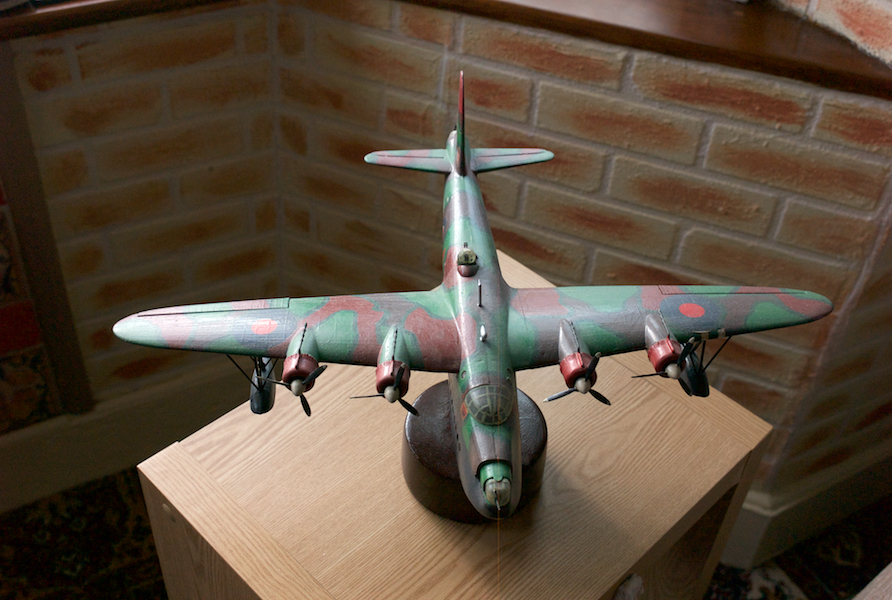
William's diecast model of an aeroplane
Eve: Let me ask you about your collection of diecast models.
William: Yes, I collect diecast models. I've collected them for many years, since I was young, well, since I was able to afford them.
Eve: What made you start doing that?
William: I just like the models.
Eve: So have you done it for a long time then?
William: Yes, for years and years…

Bobby Moore statue
Eve: What about you Michael? Your dad wasn’t particularly into football but what did he like doing? Hobbies, traditions or …
Michael: Erm. His big thing was tinkering about down the shed doing any sort of work at home. But I suppose his hobby would have been fishing. He loved fishing. He tried to get me into it. I hated it. I used to think it was boring. I did go a few times with him, but he didn’t really get me into that. I suppose a big thing... it wasn’t a big thing like you see on TV…. sit down and talk about problems and all that. He was a fantastic dad, but I suppose my biggest thing with my dad was watching him work. Whenever he wasn’t at work he was always down the shed, whenever he was doing anything indoors I was always watching him. He used to let me get involved and stuff.
Eve: What sort of things did he make?
Michael: Anything…. Not so much making stuff… repairing, painting decorating, making a fence… he wasn’t a bricklayer, but he could lay bricks. He’s made a load of walls down this street – some of them are still standing, some ain’t
Eve: Did he teach himself, or did he…
Michael: Yeah. He was a steeplejack… that was what do you call it … his profession, dunno, that was his thing he was a steeple jack till he went on the council… and when he was on the council he had to do a bit of everything… but before that he was always handy and that’s where `I think I get it from … cos I won’t say I was the best at DIY but I’ll have a go at most things.. because of that
Eve: So really you watched him... observed what he was doing so you just gradually learnt it yourself, which I think is really interesting. Do you think you passed that on to…your children at all?
Michael: No, not at all… not at all.
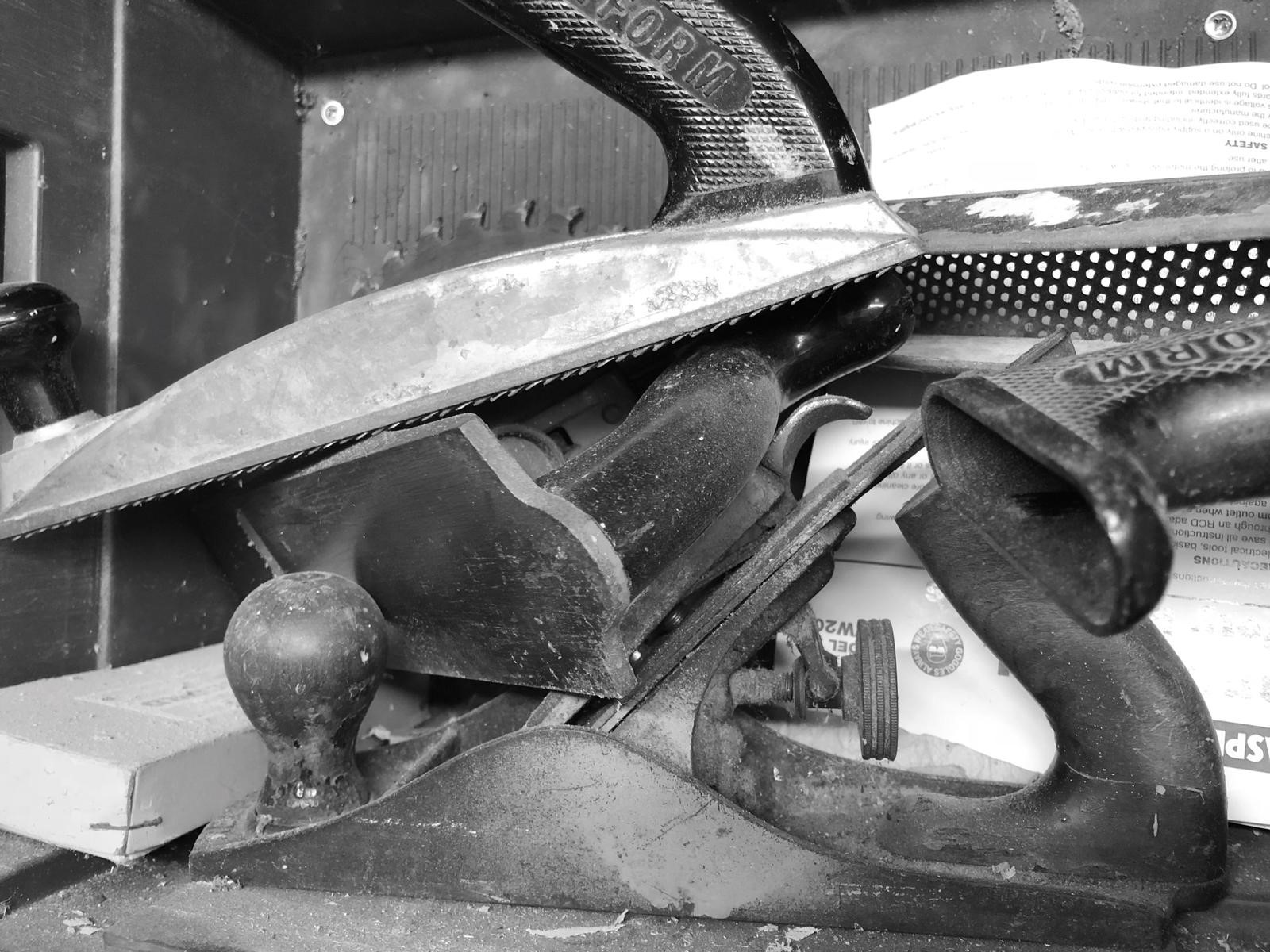
Michael tools
(laughter)
Michael: Yeah I was down there this morning (in the shed), pottering about…I love all that … especially being semi–retired as well… I get down there and start making stuff. ... I’ve started … my latest thing is… I’m into my family history, though I haven’t done a lot on that lately
Eve: I found what you’d written on line.
Michael: Oh yeah it’s all over… You look for that and it’s everywhere where I’ve asked people
Eve: I couldn’t find out any more either.
Michael: I ask … when I come across anyone that’s vaguely German, I always ask them. So family history I got into a few years ago… yeah, messing about down the shed… like my football... I like messing about on the computer… I like that I like playing around on the computer.
Eve: So you’re good at the computer.
Michael: I wouldn’t say… I’m all right, I’m not an expert.
Debbie: You like photography – you done that.
Michael: Oh yes, photography. I like me old programmes as well… I like old movies and things… fifties and sixties films… old British films… the usuals ‘Dad’s Army’ – I love all them and of course, my football, West Ham so…
Eve: So you’ve got a wide variety.
Michael: Yeah, I suppose it is really.
Debbie: Well my dad was a scout master. His sister was a brown owl and a guide, so I was dragged into Tweenies, Brownies and Guides and on the nights my dad was having scout groups I was taken there just to give my mum a break. So I had two brothers used to go Cubs and Scouts and I used to go Tweenies and Brownies and the nights I didn’t have them, I was dragged with them anyway.
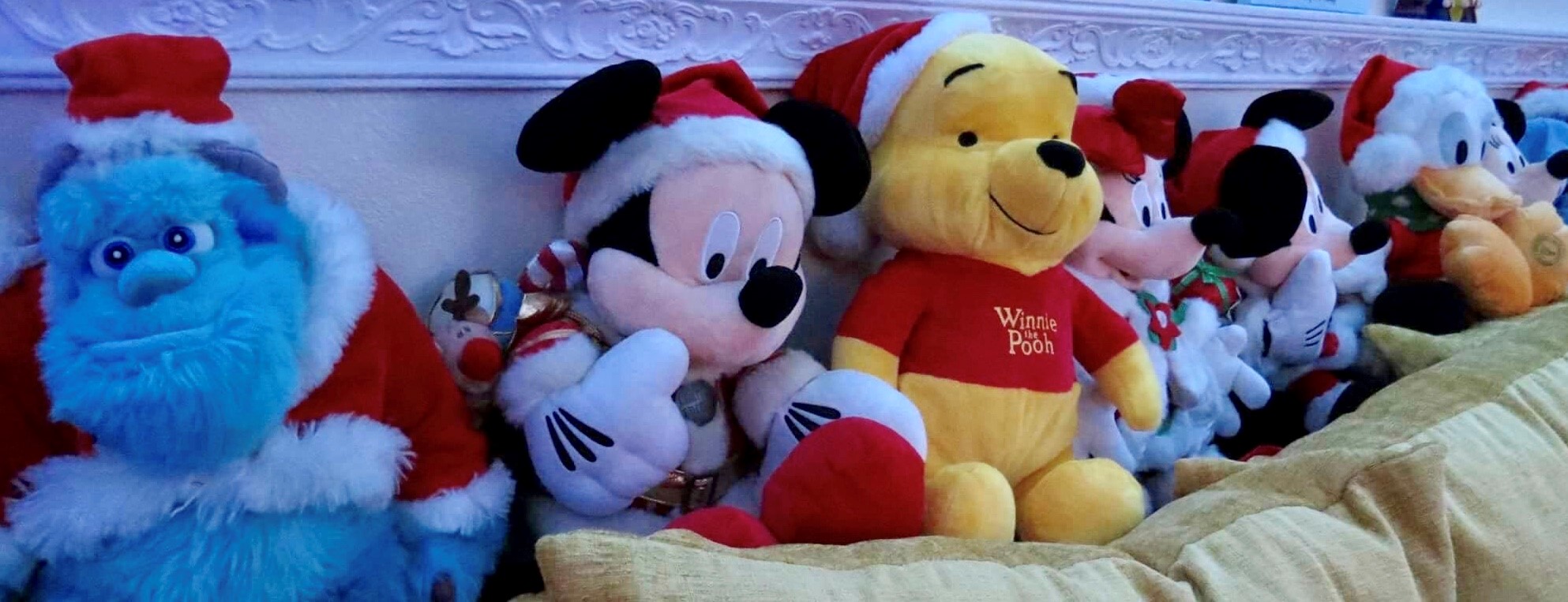
Debbie also has a large collection of Disney artefacts and travels internationally to Disney parks alongside other far-flung trips.
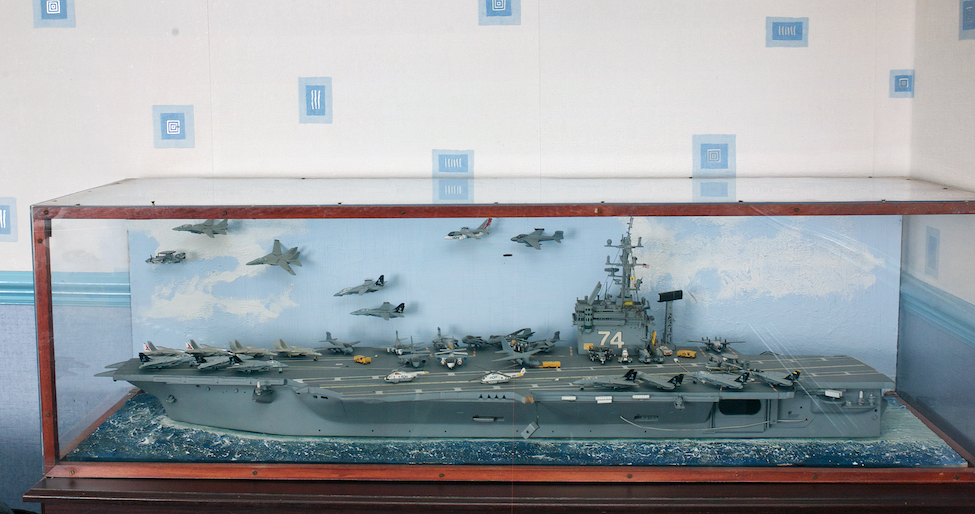
David's aircraft carrier model
David: I started like most kids did. I used to build things, used to build models and it just carried on from there. I think a lot of blokes… I think they stopped doing that and then they find another hobby like this sort of thing. I think that's what it was. On one day I started making ships and it went from there. This (large model of US aircraft carrier) took me 4 years to build.
Eve: How did you build that actually?
David: It's just bits of wood. The actual walkways are the tops of BIC razors.
Eve: Gosh!
David: Yes, BIC razors all the way along. I think the only thing that was actually bought on all of this was the aeroplanes and the rest, we just found bits of wood on skips and bits of plastic and I worked with it and made it and it came like it is.
Susan: It's even got little flags and the anchor comes down.
Eve: This is fantastic.
David: It took me a long time to design. I drew up the plans and that.

David's Naval themed shed
Susan: It was, see this is what he does. It's a beautiful jewellery box. When we went to Egypt, as you know, we love things Egyptian, so it was our wedding anniversary so what he done was as a surprise. He made me this beautiful jewellery box which is fantastic. It was our 21st wedding anniversary so he made this and then he made me this as well which is a different type of box.
Eve: So are these actually meaningful (pointing to hieroglyphics)?
Susan: Yes, hieroglyphics for our names.
Eve: How did you find those out?
Susan: Because when you go there you can get papyrus made out for you and you give your name on it, so you pick the picture that you want. And so that was our 21st wedding anniversary. And then he…
Eve: Hope you’ve got a lot of jewelry to put in all of this!
Susan: Then he made me this which is a different type and because he knows my fascination …
Eve: What do you put in there?
Susan: Well nothing really. It's just like a model. You started putting papers in there and then you just had to open it and put it back together and then he made me this which is another little jewellery box.
David: But that's what I do at weekends. I go down to my shed …

One of Susan's Egyptian jewellery boxes
David: But that is more or less the size of a double garage. But you'll see it when you go down there. It's not small, it's very big. I designed it. I designed everything. It was my design. And then I designed the inside.
David: And I used that to create my dream because it is my little world. It's really fantastic. It's got everything in there that I need. It's got my TV, my music, my coffee machine…
Susan spends her time child-minding and looking after her extended family and, apart from travelling extensively with David, she has little time for hobbies.
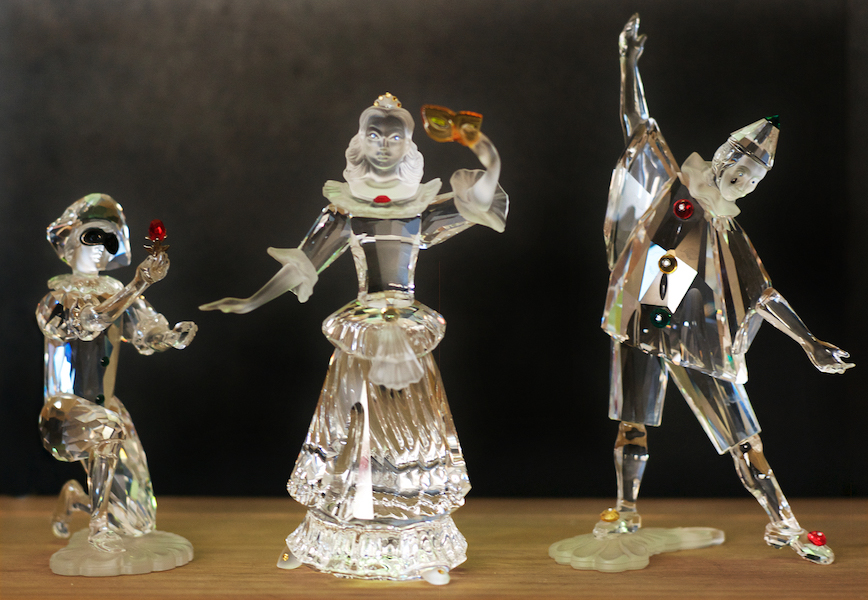
Mary's glass figurines collection
Eve: But let’s come back to you and your… you’ve got a lot of skills, both of you and I’m really interested in knowing more about your skills, your collections,this beautiful house that you’ve got and how did you learn… why did you…do all the things that you’ve done
Mary: I don’t know, I don’t know… because we like nice things
Eve: I mean why did you decide to start collecting the crystal for example.
Mary: My cousin started buying it and then what we done, cos they’re quite expensive … they don’t sound expensive now, but them big ones were like £200 and then you get a collection, a group of them and then you go into their club and then they send you things. I must have been collecting for about, I should say at least 25 years.

Mary's crystal collection
Eve: You don’t have them terribly on display do you. Is that because you’re worried about getting burgled?
Mary: No… they was in here. Then the fish tank took priority.
James: Her crystals is out there. Some of the crystals she’s got in there are very expensive.
Eve: When did you decide to start collecting them?
Mary: That’s got to be about 30 years ago I think.
Eve: And was it because you just liked beautiful things.
Mary: I don’t know, It just started off and …. I don’t like everything cluttered up but I do like some nice ornaments because where we lived in two rooms with two children, when we come here it was like all our belongings when we moved here come in one room. We never had nothing when the kids were little. We just both worked and bought what we had.
James: We had to work hard to keep things going.
Mary: This was a council house when we moved in. Obviously, we bought it off the council and we used to go to work… and… used to do machining indoors...the kids would go to my sister…for a couple of hours and I’d do early morning cleaning and then go back and do night time as well so.. and my mum had the kids when I went to work... so really, we never … well we did see one another but it was…
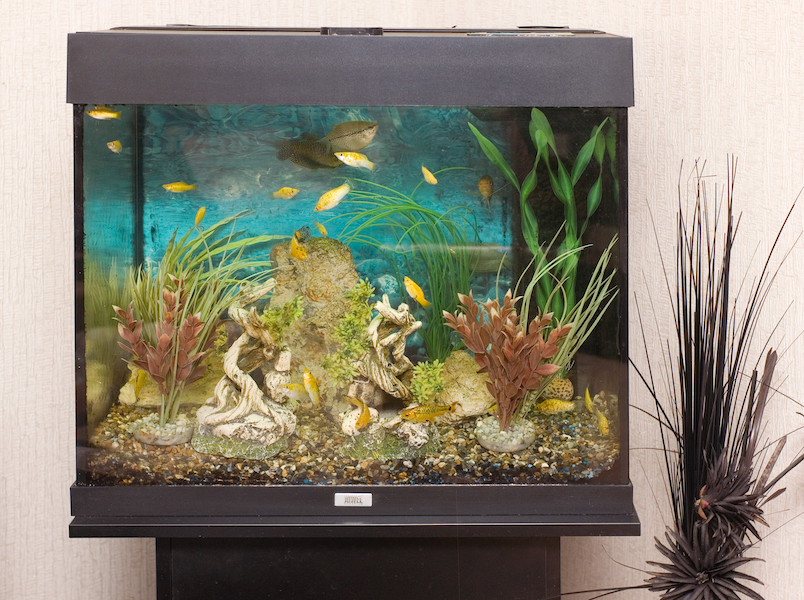
Mary and James fish tank
Eve: Tell me about the fish tank as well.
Mary: We’ve had a fish tank for years.
Eve: Why did you get interested in that?
Mary: I don’t know. Well he used to go fishing
James: I used to go fishing
Mary: And my son used to go.
Eve: So there’s something that…
Mary: Yeah, something that was passed on.
James: And out of that.
James: I had one out there. Big carp in it and all that. Yeah, I had a lovely thing out there but I was always interested in fish.
Eve: Tropical ones.
James: We were sitting here last week and we looked in there and there was about 20 little ones swimming about and we’d never had little ones.
Mary: We’d never had little ones. And out of them all we only got four left.
James: So we put them in that.
James: So I put them in that little dish up there.
Eve: So what happened to the others then?
Mary: They must have eaten them.
James: See the little ones swimming around in the pot.
Mary: There’s four in there Normally they lay eggs don’t they but they must have had…
Eve: I wonder which one they’re from then...
James: Kissing gourami over the back. See the big one out the back? Right over the back.
Mary: That one over there.
Eve: Oh that one at the top.
James: It’s Kissing gourami – that’s what they are.
Mary: We’ve had loads, we’ve had tropical. We’ve had cold water. fish. we’ve had a few. They are soothing tho’ and when the kids come in they love them. All kids love it. Any kids that come in.
Melissa: ... I didn't like school but we all had to go. We all had issues at school but I think it was worse because I was picked on because I wore glasses at school and that made me more determined not to wear the glasses when I was at school. If I didn't wear the glasses I didn't get picked on. You get picked on if you've got green braids, blue hair, whatever you've got you get picked on but obviously you don't realise that as a child that everyone does get picked on. I just don't wear the glasses now. When I was a child I stopped wearing them. I did have an operation. I had a squint in the right eye and I had an operation on, that but that was it.
Eve: So do you think your education was better than that of your parents or do you think theirs was better?
Melissa: When you think about it I would say it's better in the subjects that was offered but with regards to the techniques of learning theirs was probably better because it was more stricter.
Lisa: I was naughty so I didn’t get no qualifications. So I didn’t take none of their skills.
Lisa: So my schooling was completely different. When I went to school there was loads and loads of people that must have had dyslexia but that wasn’t heard of then…. So there was loads of people that must have had it, but it’s only been since their generation, these or just before these, that it’s actually come out why.
Eve: You must have learnt an enormous amount by being in the police force. If you had to tell us about them or some of the different skills that you've learnt from work now, what would you say that you've learnt or that you're learning now?
Melissa: How to manage, how to deal with people with mental health illness who are often unaware that they’re ill. You would see how different people try to be when they come out or when they are transferred to their own Hospital. They’re are actually more calmer and sometimes they don't even remember being unwell. It's like Jekyll and Hyde. I’ve learnt as well not to judge people or to see people as more individual and not needing help and needing help.
Eve: It must be quite difficult to converse with people
Melissa: Yes, when they first come in they’re very unwell and sometimes they’re violent and very abusive towards other staff and to other patients. However, when occupational therapy, psychology and a lot of work goes on with the consultants - and obviously taking the right medication - sometimes people stop taking the medication which obviously makes them fall back in the system - but as you appreciate, being a private hospital, sometimes it's when the NHS can't deal with them and they think they need to go to a more secure unit ‘cos some of them have been on a ward which has been a mixed ward.
Eve: Do you think any of those sort of skills you learnt from the police or do you think you learnt them through growing up with your Mum and Dad or do you think you just have it in you?
Melissa: I think my work with the police has made me more strong minded, but also learning on the wards because I know that if I hadn't worked with the police I wouldn't have had such a strong mind and I wouldn’t be able to do that, so now you can stand up tall and you can be positive. You’re giving strong vibes across. Somehow, you don't feel threatened like if you done it the other way then you could be quite easily intimidated on the wards and some people who have worked on the wards have only lasted a day you have to be in the right frame of mind.
Karen: So when we went down the caravan that would be sort of five on a Friday afternoon, normally I’d try to finish work a bit earlier, they finished school, in the car down the caravan. So that was their freedom because down there they had the run of it, but nine times out of then I’d end up with all the kids at my caravan which I come to me, cos the mums would come to me and go
Eve: You’ve still got your caravan?
Karen: No no. we got rid of that a few years ago cos as they got older they didn’t want to go down there any more, you know what it’s like and it’s an expense I’m paying for and I might just as well sit at home, but no, when we used to go down there but and I say to them but you take for granted you’ll see sea and sand every weekend, whereas somebody has to go on holiday to see sea and sand, so you’ve had that…
Karen: My mum give me her car and then I bought a car, I bought a Beetle which is my life and …
Lisa (Mary and James Harding’s daughter)
Eve: OK. Let’s come on to family get togethers that you can remember.
Lisa: My mum used to always have parties… always… I can always remember her having parties, or us going to parties… just a party.
Lisa: I think most people go to Bingo more than go to the pub.
Brian Green (Michael Green’s son)
Eve: Let me take you back to when you were at school and when you were learning. Do you think your learning at school was very different from that of your parents when they were at school learning and in what ways if it was? What sort of advantages do you think that you had that weren’t open to them?
Brian: Do you mean in the context of changing ethnic demographics or…
Brian: Yes, yes. The first thing is, obviously, that we may have had more access to technology. When I did my GCSE, for example, I was the first group that did GCSE ICT and it was a double award. The year before that, they didn’t have that award. I suppose technology plays a role. It plays a role in the classroom setting, having access to technology, that my parents wouldn't have had and it does influence one’s world view. So that's one big difference. And then, obviously, there’s a lot more pressure to go to 6th form college and then to go on to university, more educational drive rather than the practical skills that they learnt. And me and my sister did go to university I went on to do a Master’s as well.
Christopher: You see a lot of … it’s not a bad thing but you see a lot of people, they go secondary and then they move on to college and all they probably want to do is go to work behind a desk..…. Not bad cos we still need that in today’s society, but you don’t see a lot of skilled hands …it’s quite a shame, you don’t see a lot of people taking up a trade or... I mean I’ve got mates that you know were born here, they took a couple of trades on, to be fair, but you don’t really see it a lot, most people want to work behind a desk which is not a bad thing.
Jason (Susan and David’s son)
Eve: Do you think your education then was very different from that of your parents?
Jason: Yes, definitely, definitely, I think the opportunities were more available for people of my generation. My mum always said that people just didn’t go to University of her age but now everyone goes and it’s something I've heard before that people from their generation didn't go and I definitely think that the level that's on offer is higher but even since, even since my growing up, like the school there has been rejuvenated a lot. It looks drastically different. It's clearly, there's a lot more money in it now, for better or worse, and it looks like there's a lot more facilities available for kids there now than when I was a kid let alone at the time of my parents’ schooling. I think it's changed for the better with there being more facilities and more of a support network in place.
Eve: Academically it's doing very well isn't it?
Jason: Yes, they call it the Eton of the East End because it sends as many people to Oxbridge as Eton does.
Eve: Really, that's fantastic.
Jason: As at the higher end of the private schools
Eve: Amazing.
Jason: It wasn't that good when I was there.
Eve: What do you think that might be due to?
Jason: I’ve heard it was due to the headteacher who came in when my niece was there and I’d left years before. He was very strict and clearly for some reason it was a benefit and paid off. It was very strict and very disciplined and very rigid but that's worked for that reason.
Eve: If you had to choose, I know you don't have children yet, but if you had to choose a school for your child what qualities do you think you would choose?
Jason: I would look for academic outcomes, how many people got As to Cs and how many they sent to Oxbridge, they would be my main or at least my first consideration. Definitely. And then I would look at the facilities themselves how well the school looks kept, and yes, and how many different facilities are available, sports facilities and things like that, how much money has been put into the building itself.
Eve: Do you think both your mum and dad had a similar sort of education? Was your dad able to continue further? Do you think he had more opportunities?
Jason: Interesting. I don't know. I've never thought about what my dad's schooling was like. It sounded a bit more strict than what my mum's was. I'm not sure if that's his parents upbringing or if that was the school itself. It sounded more strict, more academic, yes, so I think my dad's was different from my mum's in some way.
Jason: A lot, I think, a lot. I imagine the schooling back then to have been a bit more archaic, very, here’s what the text book says, memorize it, whereas now, in science, for example, there are experiments and in English you’ll study a wider range of books than they had back then and you’ll study some sort of Media aspects and TV in English as well I think the range of courses that are on offer are wider now, they give people a more rounded sense of education. I imagine back then there was rather a dogmatic view of education, just English, maths and science and that was it then, no other subjects were real, whereas now they can study media they can study Music and Drama and things that make you a more rounded person as opposed to just the foundation academic subjects. That's what I imagine to be the main difference.
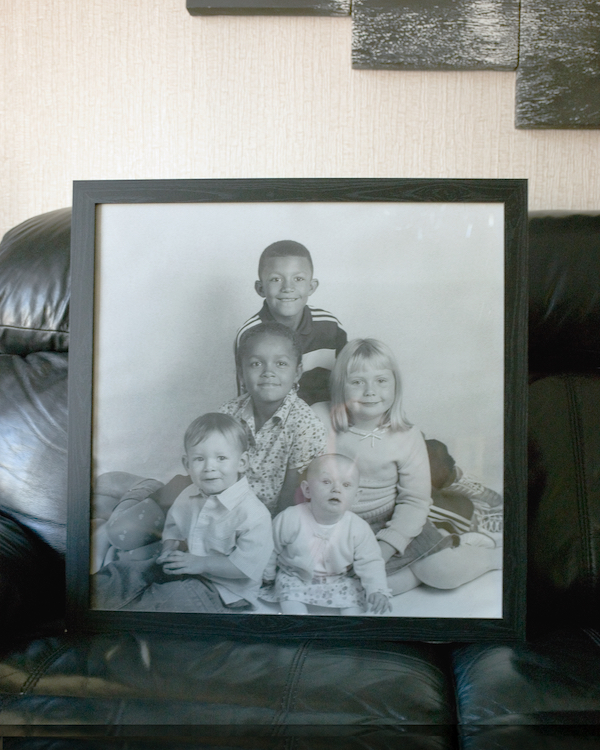
Nicky as a child, with her siblings.
Nicky (Mary and James Harding’s granddaughter)
Eve: And do you think your skills and knowledge are very different from your mum and dad’s
Nicky: I do, in the sense of the way we got taught in schools and stuff was different from how you got taught and different schools teach differently. Whereas my mum works in a private Montessori school where the way they teach is different way from the way the normal kids get taught… not normal kids but the normal schools… the curriculum.
Nicky: Technology is the main thing nowadays.
Eve: OK Let’s come on to formal education and schooling er Did you attend local schools when you went to school or did you both go to the same school?
Nicky: We did go to the same school but they changed the name of it… it got moved didn’t it… Royal Docks.
Emma (William Smith’s granddaughter)
Eve: Do you think your education has been very different from so your Mum's or Dad’s?
Emma: Yes, I think it has. I sometimes ask my Dad a question and he says I've never seen this in my life!
Eve: What sort of things do you think are very different?
Emma: The type of the thing and the way they teach is very different and the way I learnt was different from the way Mum learnt and from the way Grandad learnt. We still come up with the same answers but you know for Maths it's very very different.
Eve: So do you think that puts a bit of a rift between you? How could you ask your Mum and Dad or your Grandad to show you if they get to it in a different way? It's not what the teachers want is it?
Emma: It is a bit difficult because if you ask Mum she says just do it that way but then the teacher will say no you have to do it that way.
Eve: Is there any particular subject that you like most of all, to think that you really enjoy it?
Emma: Probably PE. I like being active and playing football and basketball.
Eve: So would you say that's your favourite?
Emma: Yes.
Eve: And if you thought back about Grandad's education do you think that was very different from yours?
Emma: I think it would have been. I think they would have been taught differently.
Eve: So how do your teachers do it then?
Emma: They print out parts of a book and tell you to work from it. But when Granddad was at school, they’d work through it together as a class. For part of the Maths exam we're able to use calculators and we were all asked to bring in the calculator for Maths so all of that would have been different. Now we have a projector that hooks up to your laptop and then it projects onto the whiteboard for everybody so it's a lot different.
Eve: So it's relying on the technology now. Do you think that's good?
Emma: It can be but when there are problems then it can cause a lot of problems. I think we rely on computers too much.
Brian: But I spent a lot of time on the computer, growing up. I mean I think being quite an introverted child. I think I'm still quite introverted now. I don't want to socialize every single day. I have to sort of psych myself up before I go out and I'm not a spontaneous person in that sense. I think that that's not necessarily influenced my upbringing. I don't know if you’ve spoken to Christopher yet. Christopher will probably give you a very different story. He's always going out places. He's very much an outside sort of kid. I was always at home on the computer. Also I didn't like the idea of playing in the streets. I think I associated it with being unsafe. Once I got chased down the street and my heart was pumping like crazy and, sort of, it was never something that interested me really. It wasn't really an enjoyable experience for me most of the time.
Brian actually seems to live for his work and, in a way, his work is also his hobby.
Christopher (Brian’s younger brother)
Eve: Did you go to football cos your dad was really quite keen?
Christopher: Yeah, I mean I’ve always gone over when Upton Park was there and I used to play. Well I’ve played for various teams to be honest… erm a bit out the way… the latest team I played for was Canning Town and they trained over the top there.
Eve: So you’re good.
Christopher: I wouldn’t say I was good but I enjoyed it. That’s the main thing I think. It occupied and I was keeping myself fit as well.
Eve: Yeah. Was that something you think you got from your dad really or?
Christopher: Yeah I mean I… probably embedded into me, but I suppose if anyone doesn’t really like football… my brother don’t like football but, you become… I don’t know it becomes a part of you as you grow up and you can get into it and if you don’t like it you drift away from it but I just enjoyed it. Once I was going over there, that was it, I was hooked then unfortunately… it’s not been very plain sailing but it’s not been the best of football but I suppose you don’t really choose your team, you’re just stuck with them cos you support them.
Eve: For your mum's generation new technology has a limited importance. What about for you do you think? How do you teach your mum or your dad?
Jason: I help out a lot with phones and stuff. They've got better definitely.
Susan: I've definitely got better with phones.
Jason: Mum likes her tablet a lot now. Remember when the technology first came out? Mum was very slow to adopt it, very scared of it almost, and now she's better than Dad.
Eve: So she's taught you a lot but do you think that you teach her some things?
Susan: I wouldn't say teach. He shows me but he shows me too fast.
Jason: I try and rush her through it too fast trying to get it set up…
Susan: and then he gets annoyed when I don't get it first time.
Jason: Yes, to us it makes sense. It's very intuitive. It's simple.
Susan: He says press this, press that and you go but what button did you press first and in the end you press something and it all goes off and you think well I didn't press anything
Eve: Yes, I'm not a lover of it all really.
Jason: It seems very intuitive to us.
Eve: It forms part a big part of your life?
Jason: Yes, technology does. Definitely, it's taken over. For the better though, I think. It makes the world even bigger than it is.
Eve: So do you use all these things like Facebook and Twitter?
Jason: Facebook, yes, but I don't actually use Twitter.
Eve: The other area that I wanted to ask you about his travel. Your mum and dad have travelled a lot, haven’t they? How about you?
Jason: I went on quite a few holidays with them. As a kid I went to Greece and I went to Spain. I went to Florida. I do remember being in different countries, so having travelled has been a real privilege of mine because the fact that Mum and Dad want to travel is a real privilege I think my friends haven't travelled so much in their childhood they didn't have that same experience growing up. My friend Alex, he's very rarely been on a plane. He’s still a bit nervous about it because of the infrequency of which is done it so I feel quite lucky in that sense.
Eve: I think that's very interesting that you've seen many different countries and cultures as a child and maybe that differentiated you from some of your friends?
Jason: Yes, potentially that’s what it was. I think it could be. I always felt a bit different from people growing up around here… Maybe that's also part of the different reasons, like travelling, perhaps it broadens the mind. I think travel broadens the mind, so potentially that was another reason that I went a different route from the people who I grew up with.
Jason: For about the last year, really, going to the gym is a hobby of mine. Seeing people. I like spending time with friends I'm a social type, so my friends in Stratford, we spend some time in Stratford. I suppose that's a bonus of this gentrification aspect, this rejuvenation. We do enjoy spending time in Stratford now because there are so many social activities there, Westfield and the bars that have sprung up around it so that's the potential positive that might come to the area. I don't think it will, I don’t think we’re on the same level as Stratford, but potentially things might change. There might be new bars to come to this area to make it worthwhile. That's one of my social activities, seeing friends, going to the gym. I do actually like video games so that ties in with the technology.
Jenny: But I was always here cos my mum was a child-minder with my sister so she used to look after… go straight here from school, come here. I was always here. I didn’t really go out with people cos we just don’t ... we just wouldn’t go out… we wouldn’t do anything cos no one else wanted to and everything like that, but we was always down our caravan in the holidays …
Eve: Oh you had a caravan?
Jenny: yeah.
Jenny: Dimchurch in Kent. So all the six weeks holidays, half terms, weekends we were there and we had friends down there. We’d go out all the time. We’d go out and come back when it was but it was there, but like here we don’t do that and because my sister was here we had different friends. She was older, I was younger, so we was just together or at home, apart. We wouldn’t go out, erm
About her car… like for Nicky, a really important thing in her life…
Eve: You got your own car already?
Jenny: Yeah, yeah. And there’s the insurance, And that’s another thing. It’s just so expensive
Eve: Well I suppose not many people had their own car when they were young. How old were you when you passed your test then?
Jason: Eighteen…just last year or this year... I was learning for about nine months. It took me for ever to pass my theory, so if I’d passed my theory first time I would have been earlier.
Eve: And what about further afield? Do you go abroad very much?
Nicky: I went abroad last year
Eve: Do you remember holidays that you've been on with your Mum and Dad?
Emma: Yes, we used to go once a year with the family and me and my brother used to go out with Dad and that which was nice.
Emma: So apart from Egypt, you've been on holiday here in this country?
Emma: Oh yes, yes we've been around and we've been down to the caravan which is near Great Yarmouth, Caistor, and the caravan was right next to the beach and me and my brother used to go and play on the beach and my Nan used to sunbathe and we used to be taken to the swimming pool.
Eve: So you have happy memories of those trips. Where else have you been on holiday?
Emma: Me and my Mum and brother went to Greece which was a memorable holiday ‘cos I broke my ankle. We loved it. We went to Rhodes but I broke my ankle. I slipped.
Eve: So did you end up in hospital?
Emma: Yes. I broke my ankle in 3 places and when I got back I had to have an operation. I had to have screws put in. That was about 5 years ago.
Eve: I hope it didn't put you off Greece.
Emma: No, it didn't.